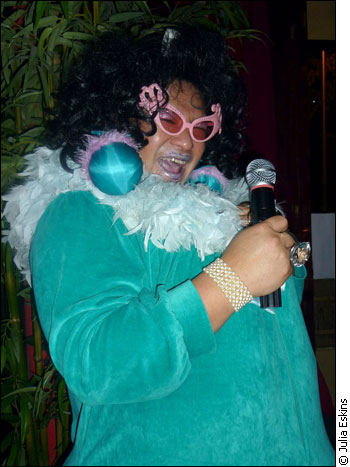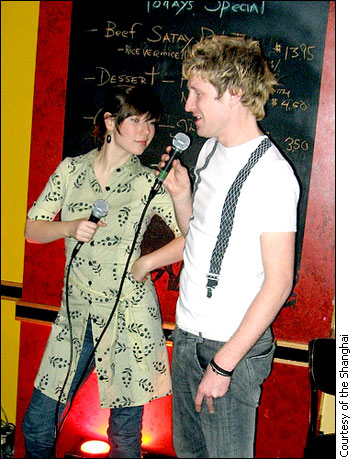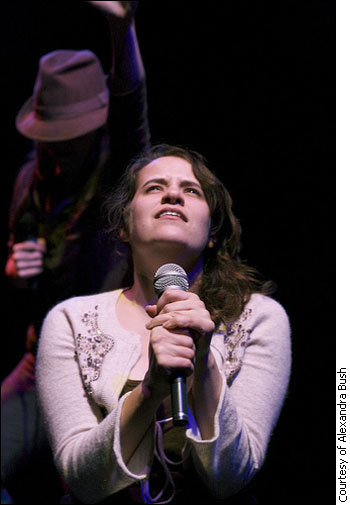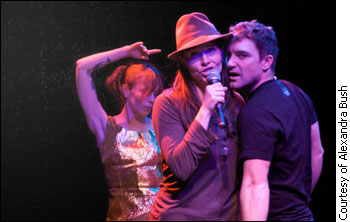Tags
Related Posts
Share This
Turning Japanese: Ottawa’s karaoke fever
Draped in blue velvet, China Doll clutches the microphone with three fingers and the natural grace of a woman. Watching those hips gyrate to the beat, the audience almost forgets about his five o’clock shadow. His ring finger is appropriately sporting a fake diamond ring the size of a golf ball and, like a true diva, he flutters it through the air as he hits the high notes.
“Love, love will keep us together. Think of me baby whenever” — China Doll belts out as he prances around the room — “some sweet talking whore comes along, singing her song.” The audience giggles wildly as he ad-libs “whore” for “girl,” and erupts again when he assures the woman in the front row that he isn’t talking about her. It’s a version of the classic Captain and Tennille song that you’ll never hear on the radio, but one you might catch at Ottawa’s Shanghai restaurant on a Saturday night.

China Doll sparkles on Saturday nights at the Shanghai.
China Doll, known offstage as Edward Kwan, is the magnetic force that brings vocals-craving crowds to the little restaurant on Somerset Street. The family-owned business has been a community hot spot since the 1970s but has recently gained attention for wild karaoke nights hosted by Kwan’s alter ego. The image of his face is spray-painted on the side of the building, and inside you’ll either find him cooking egg rolls in the kitchen or singing in drag.
Newcomers leave vowing to return next week and regulars wonder why he doesn’t ad-lib “karaoke” for “love” instead. Love doesn’t always keep people together, nor does it keep restaurants in business, but karaoke might.
The Japanese tradition of karaoke has been popular in Western culture since the 1980s, but it’s no longer reserved for gloomy watering holes. In Canada and elsewhere, mainstream bars are now using karaoke to battle slow weeknights and economic slumps.
And apparently it’s working; according to the Performing Right Society, karoke revenues increased by 10 percent during the thick of the 2008-2009 recession.
In Ottawa, karaoke bars are packed from Monday to Sunday, with the Shanghai exceeding its 70 seat capacity almost every Saturday night. If you plan on showing up after 10 p.m., be prepared to stand in the doorway to catch a glimpse of the action. In typical karaoke fashion, little white pieces of paper are delivered to the DJ booth, and singers are called up to try their luck in front of a glowing screen. Some performances seem overly practised, while others require vocal assistance from the audience.
‘The truth is, karaoke is not about being good.’ – karaoke impresario Edward Kwan
As Kwan throws in commentary, he proves to be his own bizarre version of Simon Cowell. After a man in a suit performs a technically perfect performance of Boston’s “More Than a Feeling,” he rolls his eyes.
“The bad singers are more entertaining,” he says quietly as he covers his microphone. “We have Canadian Idol rejects that come in here and think they’re really good. The truth is, karaoke is not about being good.”
Kwan is wearing a curly black wig, white feather boa and pink framed glasses. He developed his feminine persona after volunteering to throw on a wig and sing at a private karaoke party. Ever since, the restaurant’s karaoke nights and China Doll’s outlandish outfits have been a celebrated attraction.
“It’s a total bonding experience,” says Kwan as he walks to the front of the restaurant. “Let me get that for you, honey,” he croons as he opens the door for a woman, who enters grinning uneasily. Kwan puckers his silver tinted lips and adjusts his wig. “Some people come in here looking so shocked. I just tell them to shut their jaw. When you step in here, you’re not in Ottawa anymore. You have to expect the unexpected.”

Performers at the Shanghai: free to do badly or well.
The Duet
At Carleton University, karaoke has turned a typically low-key graduate student bar and a slow Tuesday night into a midweek diversion.
“When we first started coming here, Mike’s Place was dead on a Tuesday. Through word of mouth, it went from five people to this,” says Carleton alumnus Justin Samlal as he gestures around the room. Tables are filled with people hunched over song binders and sipping beer, trying to gain some liquid courage to perform.
People can sing sometimes poorly, often ridiculously, with no social consequence.
Host Kristin Marand sits behind the equipment, watching the action. Asked about karaoke’s appeal, she replies with a shrug. “It’s the next level of singing in the shower. People jump at the chance to have an audience and let loose. It’s all about having an outlet. You can be awful and it doesn’t matter, it’s karaoke!”
In a world where cheers will follow just about any performance, people can sing sometimes poorly, often ridiculously, with no social consequence. This fun, supportive atmosphere is what keeps people coming back.
Samlal and friend Jacob Campbell have been coming to Mike’s Place karaoke every Tuesday for four years.
“I used to purposely avoid scheduling class on Wednesday mornings, and now I purposely avoid scheduling work meetings that day,” says Campbell.

Sara Edwards embraces the moment in a heartfelt performance.
They perform as a duo, and will begin tonight with a choreographed repertoire of Bloodhound Gang’s “The Bad Touch”. As they get up for their turn, about ten people follow suit; everyone seems to know the hip-thrusting dance by heart. Their university days may be over, but karaoke keeps the bond strong.
The Soloist
For those seeking a romantic partner, the spotlight can be the perfect place to meet someone. Danni Plume has introduced karaoke to more than a dozen regular venues in Ottawa with her and her husband’s traveling karaoke show, Dog and Pony Sound. From the Royal Oak to the Lookout, Plume attributes busy karaoke nights to what she calls “the lonely hearts club” factor.
“Typically the people who come out here are looking for something. At gay bars, it’s very cute. The boys get up and basically market themselves to the room,” she says. “When they’re finished singing, there’s usually someone waiting to buy them a drink.”
Plume says she has combined her love of karaoke with a psychology degree to bring karaoke therapy to the capital. Karaoke can help people overcome fears of public speaking, especially in a relaxed bar environment with audience and host encouragement, she says.
“I was hooked after my first song. I enjoyed the exhilaration of stepping out of my shell. I enjoyed challenging myself. I enjoyed the camaraderie. Everyone supports each other.”
Karaoke’s popularity is a product of the people: both the performers and the audience, the fuel and the fire. Outside of lecture halls and cubical walls, karaoke offers a judgment-free atmosphere where anything goes. One man got so comfortable at the Shanghai one Saturday night, he took off all his clothes during his solo. We can only hope that that doesn’t mark the opening of a new Chippendales. But racy nights like those are getting Ottawans to strip off their apprehensions and shine.

Amy O’Neal and friends at the Speak and Sing
Who wants 15 seconds of fame when you can have three and a half minutes? You may not know the words, you may have forgotten the tune, but if you can pretend, you can karaoke.
Related Links
Society of Composers, Authors and Music Publishers of Canada
Performing Right Society for Music





